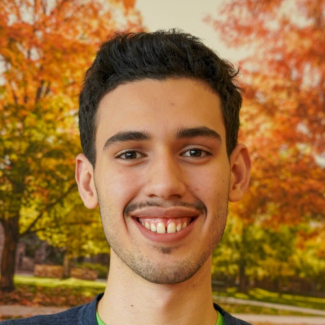JILA undergraduate student Aaron Barrios has recently been honored with the prestigious Jacob Van Ek Scholarship, an accolade from the University of Colorado Boulder College of Arts and Sciences to a select group of exceptional undergraduates. This year, Barrios is among 23 distinguished students to receive one of the college's highest honors, reflecting his outstanding contributions and academic excellence in Physics, Astronomy, and Mathematics.
The scholarship is named after Jacob Van Ek, who profoundly impacted CU’s academic landscape. Van Ek, born in 1896, began his illustrious career at CU shortly after completing his doctorate in 1925 at what is now Iowa State University. He quickly ascended from an assistant professor to a full professor within a mere three years and served as the dean of the College of Liberal Arts from 1929 to 1959. His legacy continues to inspire and recognize student excellence through this scholarship.
Aaron Barrios's research, under the mentorship of JILA Fellow and Astrophysical & Planetary Sciences professor Jason Dexter, focuses on the intriguing dynamics of black holes and accretion disk theory. Barrios' work primarily investigates how isotropic emissions around black holes can become anisotropic, a critical study in understanding the behavior of light and radiation in extreme gravitational fields.
Written by Kenna Hughes-Castleberry, JILA Science Communicator



 The Physics Frontiers Centers (PFC) program supports university-based centers and institutes where the collective efforts of a larger group of individuals can enable transformational advances in the most promising research areas. The program is designed to foster major breakthroughs at the intellectual frontiers of physics by providing needed resources such as combinations of talents, skills, disciplines, and/or specialized infrastructure, not usually available to individual investigators or small groups, in an environment in which the collective efforts of the larger group can be shown to be seminal to promoting significant progress in the science and the education of students. PFCs also include creative, substantive activities aimed at enhancing education, broadening participation of traditionally underrepresented groups, and outreach to the scientific community and general public.
The Physics Frontiers Centers (PFC) program supports university-based centers and institutes where the collective efforts of a larger group of individuals can enable transformational advances in the most promising research areas. The program is designed to foster major breakthroughs at the intellectual frontiers of physics by providing needed resources such as combinations of talents, skills, disciplines, and/or specialized infrastructure, not usually available to individual investigators or small groups, in an environment in which the collective efforts of the larger group can be shown to be seminal to promoting significant progress in the science and the education of students. PFCs also include creative, substantive activities aimed at enhancing education, broadening participation of traditionally underrepresented groups, and outreach to the scientific community and general public.